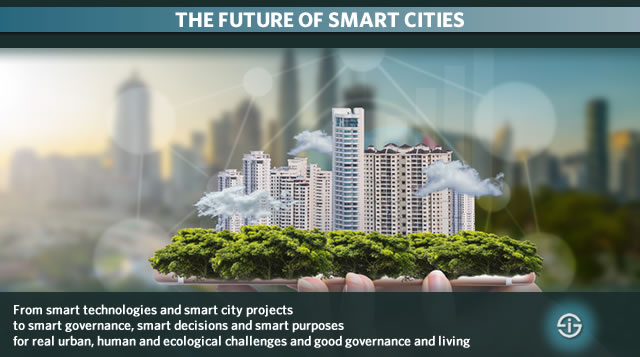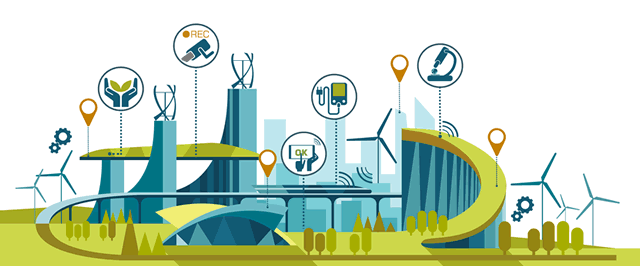What is the future of smart cities? It depends on how you define a smart city.
Just as about anything that has the the word smart in it nowadays, smart cities point to the usage of smart technologies, bringing levels of autonomy to systems and monitoring, understanding and improving what needs to be monitored, understood and improved so that cities are more efficient, adapted, flexible and transformed in function of changing contextual factors.
In the scope of smart cities these contextual factors can mean many things and thus lead to many applications and use cases, often also with the word smart in them and always with the Internet of Things as one core element: smart buildings, smart transportation systems, smart governance, smart healthcare, smart infrastructure, smart interactive information panels, smart street lighting (LED!) and smartphone apps to perform myriad tasks.
If you want to see the possible and what the future of the smart city might be it’s always good to take a trip to Dubai and Gitex Technology Week. On the other hand, let’s face it, what happens in Dubai won’t really happen everywhere as some tradeshows can be, well, shows.
Anyway, the list of smart technologies and use cases you can see in the future of smart cities is endless (certainly if you start including sub segments such as smart waste management, smart parking, smart traffic systems etc.) and is enabled by myriad technologies we tend to categorize as intelligent: IoT, advanced data analytics, artificial intelligence, edge computing, you name it.

The future of smart cities – ecology, engagement and ecosystem
Of course a smart city is a holistic concept (just as our built environment overall) whereby actionable intelligence and interconnectedness are key but people are even more key. A city is already a holistic and complex ecosystem as such, regardless of whether it’s smart or not.
As a smart city is a holistic concept and about more than technologies which should really be at the service of citizens (which as you know are predicted to grow in cities and are poised to live longer), safety, mobility, health and various stakeholders, a smart city is more than launching smart city applications.
In smart cities as well ecology, energy efficient technologies (and energy efficient building technologies) and smart ways to deal with natural and other resources, including recycling and the so-called circular economy which also is key in Industry 4.0 as, for example the industrial strategy of the EU shows, should be essential drivers and part of early smart city projects.
The ad-hoc approach with test projects and unfortunately sometimes even isolated smart city initiatives is certainly still part of the future of smart cities. On the other hand there are also more mature initiatives where a holistic view is present and ecosystems are involved and shaped, among others through involvement of citizens in forms of collaboration. Collaborative citizen engagement initiatives by the way are among the smart city best practices.
What is also certain about the future of smart cities is that we’re going to see even more initiatives in 2018 and beyond (while on the other hand several smart city test projects have been stopped). On October 24rd, 2017, the beautiful university city of Leuven (Belgium), for instance, announced a bunch of smart city initiatives in collaboration with our Alma Mater and a few companies and associations, an ecosystem indeed. The initial focus will be on healthcare, mobility and, how else could it be, air quality. One of the involved companies is former Belgium-based wireless technology glory Option with its sensors.
We mention this random example as it is recent, close, yet another addition to the increasingly long list of cities with smart city projects and does tackle some of the real major challenges of cities such as pollution. We love smart city initiatives where air quality monitoring, control and improvement is key – pollution is a killer.
The future of smart cities – revisiting good governance and the essence of real urban challenges
Another such city from that increasingly long list is Barcelona, also the home of Smart City Expo World Congress, another major event, albeit with a focus on smart cities alone.
At the time of writing this we see that the future of the smart city will also be discussed at the – rapidly – approaching next edition from November 14th until November 16th. Smart City Expo World Congress is an event of Fira Barcelona, the people behind Barcelona’s Industry Week IoT Solutions World Congress to name a few.
At Smart City Expo World Congress 2016 Jerry Hultin set the tone to move beyond the technology aspect (and fascination now and then) to the ‘second act’ where purpose, practical, financial, ethical and other questions enter the scene.
We do wonder what the view on the present and future of the smart city will be at this edition though. Because, let’s face it, we’ve all come to realize and see in 2017, among others at the cost of human lives, that smartness isn’t just about use cases, technologies and so forth. Whether a crook is sitting in a city council or a smart city council and whether he is smart or not: he remains a crook. The same goes for bad regulations, corruption, the choice for cost savings over human safety and so forth.

While the future of smart city technologies might look bright and bring us to next stages of what is possible but most of all feasible and useful, many smart city projects really have also shown to offer little value and, keeping the terrible events in some cities in mind, the ethical dimensions, regulations, prioritizations with regards to how technologies can make a real difference and revisiting the principles of good governance and looking at what is wrong in so many cities today must be part of any smart city future discussion.
However, more about that later but let it be clear: a city is far from a computer indeed.
The future of smart cities in an infographic
We promised to talk about the future of smart cities and that means some data and an overview of smart city evolutions as well.
On October 24th 2017 the people at Telefónica who have been playing an important role in smart cities, co-founded a new group to enable open and interoperable smart cities early 2017 (ecosystems!) and are from Spain where Smart City Expo World Congress 2017 takes place posted an infographic resuming some future smart city trends for us and you.
Among the data they aggregated from various sources for the infographic:
- The market size of smart cities is expected to grow from 361.17 billion Euros this year to over 1,020 billion by 2022.
- Smart energy will make up close to a quarter of the overall smart cities market by 2025. In some regions this might even be higher, especially if we look at coming regulations on the level of energy efficiency and energy efficient technologies.
- And to make the benefits of IoT in specific smart city projects that make sense for everyone tangible a last one: Barcelona, where Smart City Expo World Congress is held and Telefónica is present, saved over 42 million Euros a year in water savings.
That is what we like to see to enable smarter governance and future smart city deployments for the benefit of people and the ecosystems we all live in.

Top image: Shutterstock – Copyright: ShutterOK – Middle image: Shutterstock – Copyright: Dmi T – all other images belong to their respective mentioned owners

